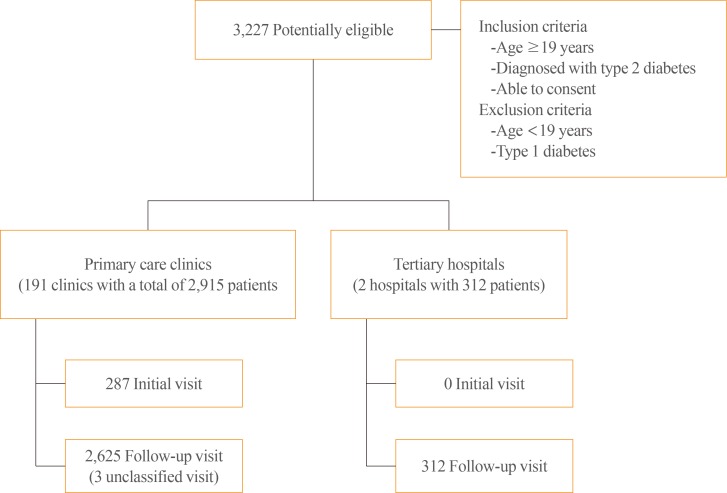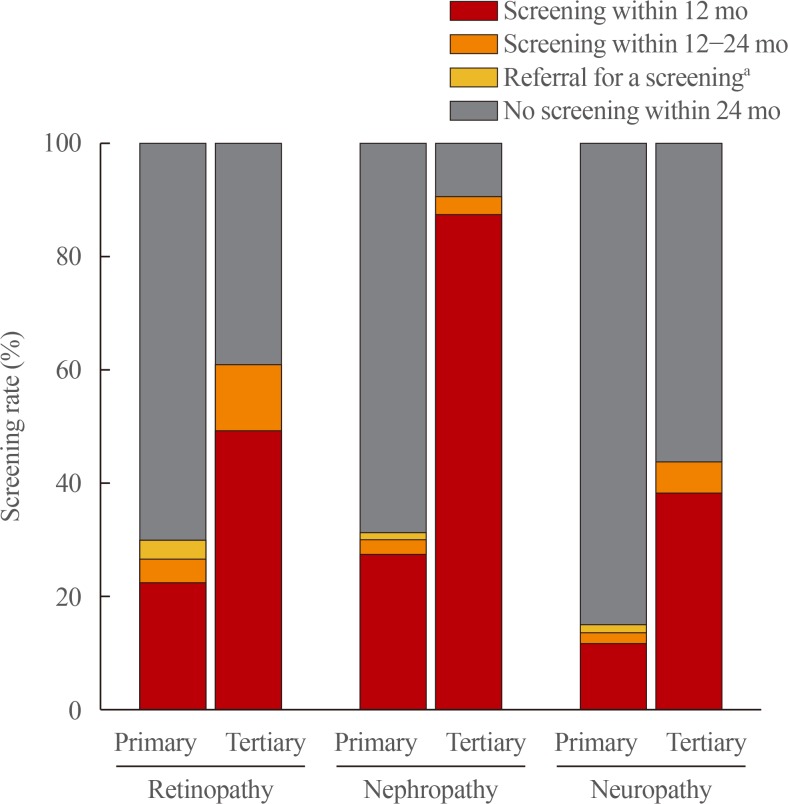Current Management of Type 2 Diabetes Mellitus in Primary Care Clinics in Korea
- Affiliations
-
- 1Department of Endocrinology and Metabolism, Inha University School of Medicine, Incheon, Korea.
- 2Graduate School, Yonsei University College of Medicine, Seoul, Korea. BSCHA@yuhs.ac
- 3Department of Internal Medicine, Gangnam Severance Hospital, Yonsei University College of Medicine, Seoul, Korea.
- 4Severance Institute for Vascular and Metabolic Research, Yonsei University College of Medicine, Seoul, Korea.
- 5Division of Endocrinology and Metabolism, Department of Internal Medicine, Yonsei University College of Medicine, Seoul, Korea.
- 6Institute of Endocrine Research, Yonsei University College of Medicine, Seoul, Korea.
- 7Medical Information Team, Ildong Pharmaceutical Co., Ltd., Seoul, Korea.
- KMID: 2458631
- DOI: http://doi.org/10.3803/EnM.2019.34.3.282
Abstract
- BACKGROUND
This study investigated the overall status of diabetes control and screening for diabetic microvascular complications in patients with type 2 diabetes mellitus attending primary care clinics in Korea.
METHODS
In this cross-sectional observational study, 191 primary care clinics were randomly selected across Korea from 2015 to 2016. In total, 3,227 subjects were enrolled in the study.
RESULTS
The patients followed at the primary care clinics were relatively young, with a mean age of 61.4±11.7 years, and had a relatively short duration of diabetes (mean duration, 7.6±6.5 years). Approximately 14% of subjects had diabetic microvascular complications. However, the patients treated at the primary care clinics had suboptimal control of hemoglobin A1c levels, blood pressure, and serum lipid levels, along with a metabolic target achievement rate of 5.9% according to the Korean Diabetes Association guidelines. The screening rates for diabetic nephropathy, retinopathy, and neuropathy within the past 12 months were 28.4%, 23.3%, and 13.3%, respectively.
CONCLUSION
The overall status of diabetes management, including the frequency of screening for microvascular complications, was suboptimal in the primary care clinics. More efforts should be made and more resources need to be allocated for primary care physicians to promote adequate healthcare delivery, which would result in stricter diabetes control and improved management of diabetic complications.
Keyword
MeSH Terms
Figure
Cited by 8 articles
-
Does Diabetes Increase the Risk of Contracting COVID-19? A Population-Based Study in Korea
Sung-Youn Chun, Dong Wook Kim, Sang Ah Lee, Su Jung Lee, Jung Hyun Chang, Yoon Jung Choi, Seong Woo Kim, Sun Ok Song
Diabetes Metab J. 2020;44(6):897-907. doi: 10.4093/dmj.2020.0199.Challenges in the Management of Diabetes in Primary Care
Yeon Kyung Lee
J Korean Diabetes. 2020;21(3):161-165. doi: 10.4093/jkd.2020.21.3.161.Comprehensive Efforts Are Needed to Improve the Quality of Primary Diabetes Care in Korea
Chan-Hee Jung
Endocrinol Metab. 2019;34(3):265-267. doi: 10.3803/EnM.2019.34.3.265.Questionnaire-based Survey of Demographic and Clinical Characteristics, Health Behaviors, and Mental Health of Young Korean Adults with Early-onset Diabetes
Ji In Park, Hyunjeong Baek, Sang-Wook Kim, Ji Yun Jeong, Kee-Ho Song, Ji Hee Yu, Il Seong Nam-Goong, Eun-Hee Cho
J Korean Med Sci. 2021;36(26):e182. doi: 10.3346/jkms.2021.36.e182.Management Status of Patients with Type 2 Diabetes Mellitus at General Hospitals in Korea: A 5-Year Follow-Up Study
Jin Hee Jung, Jung Hwa Lee, Hyang Mi Jang, Young Na, Hee Sun Choi, Yeon Hee Lee, Yang Gyo Kang, Na Rae Kim, Jeong Rim Lee, Bok Rye Song, Kang Hee Sim
J Korean Diabetes. 2022;23(1):64-75. doi: 10.4093/jkd.2022.23.1.64.Long-Term Changes in HbA1c According to Blood Glucose Control Status During the First 3 Months After Visiting a Tertiary University Hospital
Hyunah Kim, Da Young Jung, Seung-Hwan Lee, Jae-Hyoung Cho, Hyeon Woo Yim, Hun-Sung Kim
J Korean Med Sci. 2022;37(38):e281. doi: 10.3346/jkms.2022.37.e281.Risk of Cause-Specific Mortality across Glucose Spectrum in Elderly People: A Nationwide Population-Based Cohort Study
Joonyub Lee, Hun-Sung Kim, Kee-Ho Song, Soon Jib Yoo, Kyungdo Han, Seung-Hwan Lee
Endocrinol Metab. 2023;38(5):525-537. doi: 10.3803/EnM.2023.1765.Comparison of on-Statin Lipid and Lipoprotein Levels for the Prediction of First Cardiovascular Event in Type 2 Diabetes Mellitus
Ji Yoon Kim, Jimi Choi, Sin Gon Kim, Nam Hoon Kim
Diabetes Metab J. 2023;47(6):837-845. doi: 10.4093/dmj.2022.0217.
Reference
-
1. Narayan KM, Boyle JP, Geiss LS, Saaddine JB, Thompson TJ. Impact of recent increase in incidence on future diabetes burden: U.S., 2005-2050. Diabetes Care. 2006; 29:2114–2116. PMID: 16936162.2. International Diabetes Federation. IDF diabetes atlas. 6th ed. Brussels: International Diabetes Federation;2013.3. Won JC, Lee JH, Kim JH, Kang ES, Won KC, Kim DJ, et al. Diabetes fact sheet in Korea, 2016: an appraisal of current status. Diabetes Metab J. 2018; 42:415–424. PMID: 30113146.
Article4. UK Prospective Diabetes Study (UKPDS) Group. Intensive blood-glucose control with sulphonylureas or insulin compared with conventional treatment and risk of complications in patients with type 2 diabetes (UKPDS 33). Lancet. 1998; 352:837–853. PMID: 9742976.5. Stratton IM, Adler AI, Neil HA, Matthews DR, Manley SE, Cull CA, et al. Association of glycaemia with macrovascular and microvascular complications of type 2 diabetes (UKPDS 35): prospective observational study. BMJ. 2000; 321:405–412. PMID: 10938048.
Article6. Diabetes Control and Complications Trial Research Group. Nathan DM, Genuth S, Lachin J, Cleary P, Crofford O, et al. The effect of intensive treatment of diabetes on the development and progression of long-term complications in insulin-dependent diabetes mellitus. N Engl J Med. 1993; 329:977–986. PMID: 8366922.
Article7. Duckworth W, Abraira C, Moritz T, Reda D, Emanuele N, Reaven PD, et al. Glucose control and vascular complications in veterans with type 2 diabetes. N Engl J Med. 2009; 360:129–139. PMID: 19092145.
Article8. Murray P, Chune GW, Raghavan VA. Legacy effects from DCCT and UKPDS: what they mean and implications for future diabetes trials. Curr Atheroscler Rep. 2010; 12:432–439. PMID: 20652839.
Article9. Holman RR, Paul SK, Bethel MA, Neil HA, Matthews DR. Long-term follow-up after tight control of blood pressure in type 2 diabetes. N Engl J Med. 2008; 359:1565–1576. PMID: 18784091.
Article10. Ha KH, Kim DJ. Current status of managing diabetes mellitus in Korea. Korean J Intern Med. 2016; 31:845–850. PMID: 27604796.
Article11. Carls G, Huynh J, Tuttle E, Yee J, Edelman SV. Achievement of glycated hemoglobin goals in the US remains unchanged through 2014. Diabetes Ther. 2017; 8:863–873. PMID: 28646411.
Article12. Tai TY, Chuang LM, Tsai ST. Diabcare (Taiwan) Study Group. Treatment of type 2 diabetes mellitus in a primary care setting in Taiwan: comparison with secondary/tertiary care. J Formos Med Assoc. 2006; 105:105–117. PMID: 16498504.
Article13. Lim DJ, Kwon HS, Kim HS, Lee JH, Ko SH, Lee JM, et al. Clinical characteristics of the diabetic patients managed at the different medical institutions in Seoul and Gyeonggi province. Korean J Med. 2006; 71:173–181.14. Harris SB, Ekoe JM, Zdanowicz Y, Webster-Bogaert S. Glycemic control and morbidity in the Canadian primary care setting (results of the diabetes in Canada evaluation study). Diabetes Res Clin Pract. 2005; 70:90–97. PMID: 15890428.
Article15. Park YH. Strategy for noncommunicable disease control and prevention. J Korean Med Assoc. 2014; 57:808–814.
Article16. Health Insurance Review & Assessment Service. Comprehensive quality report on diabetes. Wonju: HIRA;2017.17. Statistics Korea. Population, households and housing units [Internet]. Daejeon: Statistics Korea;c1996. cited 2019 Aug 16. Available from: http://kostat.go.kr/portal/korea/index.action.18. Korean Diabetes Association. Treatment guideline for diabetes. Seoul: KDA;2019.19. Ko SH, Han K, Lee YH, Noh J, Park CY, Kim DJ, et al. Past and current status of adult type 2 diabetes mellitus management in Korea: a National Health Insurance Service Database analysis. Diabetes Metab J. 2018; 42:93–100. PMID: 29676539.
Article20. Korean Diabetes Association. Diabetes fact sheet in Korea 2018. Seoul: KDA;2018.21. Introduction: standards of medical care in diabetes. 2018. Diabetes Care. 2018; 41(Suppl 1):S1–S2. PMID: 29222369.22. Yoo KH, Shin DW, Cho MH, Kim SH, Bahk HJ, Kim SH, et al. Regional variations in frequency of glycosylated hemoglobin (HbA1c) monitoring in Korea: a multilevel analysis of nationwide data. Diabetes Res Clin Pract. 2017; 131:61–69. PMID: 28689084.
Article23. Liu Y, Zupan NJ, Shiyanbola OO, Swearingen R, Carlson JN, Jacobson NA, et al. Factors influencing patient adherence with diabetic eye screening in rural communities: a qualitative study. PLoS One. 2018; 13:e0206742. PMID: 30388172.
Article24. van Eijk KN, Blom JW, Gussekloo J, Polak BC, Groeneveld Y. Diabetic retinopathy screening in patients with diabetes mellitus in primary care: incentives and barriers to screening attendance. Diabetes Res Clin Pract. 2012; 96:10–16. PMID: 22137363.
Article25. Byun SH, Ma SH, Jun JK, Jung KW, Park B. Screening for diabetic retinopathy and nephropathy in patients with diabetes: a nationwide survey in Korea. PLoS One. 2013; 8:e62991. PMID: 23667557.
Article26. Zgibor JC, Songer TJ, Kelsey SF, Weissfeld J, Drash AL, Becker D, et al. The association of diabetes specialist care with health care practices and glycemic control in patients with type 1 diabetes: a cross-sectional analysis from the Pittsburgh epidemiology of diabetes complications study. Diabetes Care. 2000; 23:472–476. PMID: 10857937.
Article27. Zgibor JC, Songer TJ. External barriers to diabetes care: addressing personal and health systems issues. Diabetes Spectr. 2001; 14:23–28.
Article
- Full Text Links
- Actions
-
Cited
- CITED
-
- Close
- Share
- Similar articles
-
- Summary of Insulin Therapy for Adult Patients with Type 2 Diabetes Mellitus: A Position Statement of the Korean Diabetes Association, 2017
- Outpatient Testing for Diabetic Complications
- A Clinical Practice Guideline to Guide a System Approach to Diabetes Care in Hong Kong
- Effect of Diabetes Education Program on Glycemic Control and Self Management for Patients with Type 2 Diabetes Mellitus
- Comprehensive Management in Patients with Type 2 Diabetes Mellitus



